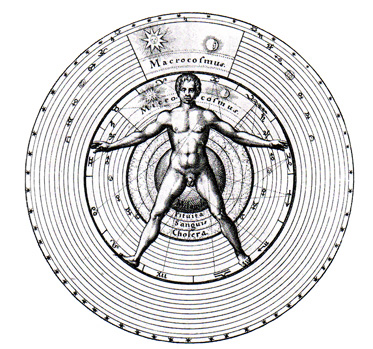
Collected Essays on Philosophers by Colin Wilson. Ed. Colin Stanley, Into. by John Shand (Cambridge Scholars Publishing 2016)
Colin Wilson’s Lulu: an unfinished novel [Colin Wilson Studies # 27] Intro. by Vaughan Rapatahana. (Paupers’ Press 2016)
The Writing of Colin Wilson’s Adrift in Soho Including Charles Russell’s The Other Side of Town [Colin Wilson Studies # 26] Ed. Colin Stanley. (Paupers’ Press 2016)
“Man is a slave to the delusion that he is a passive creature, a creature of circumstance; this is because he makes the mistake of identifying himself with his limited everyday consciousness, and is unaware of the immense forces that lie just beyond the threshold of consciousness.” (Collected Essays on Philosophers, p. 110)
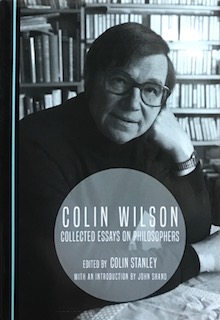 These three titles are both welcome additions to the Wilson canon and food for thought for newbies. For the latter, Collected Essays on Philosophers would be a good place to start. Drawn from various sources and from a fairly wide timescale, some of the essays will be familiar to old hands. Important thoughts on Spinoza, Nietzsche, Whitehead, Husserl, Sartre, Camus, Derrida and Foucault have previously appeared in Below the Iceberg, Anti Sartre, Existentially Speaking and The Bicameral Critic – but those books are now out of print rarities. For the hardcore there’s previously uncollected portraits of (mostly) logical positivists such as A.J. Ayer, C.D. Broad, Cassirer, Popper, Strawson, Warnock and Wittgenstein, some of which were originally written in the late Sixties. There’s a worthy introduction to Wilson’s philosophical position from John Shand, who is a rare specimen of open mindedness from the closed shop of academia.
These three titles are both welcome additions to the Wilson canon and food for thought for newbies. For the latter, Collected Essays on Philosophers would be a good place to start. Drawn from various sources and from a fairly wide timescale, some of the essays will be familiar to old hands. Important thoughts on Spinoza, Nietzsche, Whitehead, Husserl, Sartre, Camus, Derrida and Foucault have previously appeared in Below the Iceberg, Anti Sartre, Existentially Speaking and The Bicameral Critic – but those books are now out of print rarities. For the hardcore there’s previously uncollected portraits of (mostly) logical positivists such as A.J. Ayer, C.D. Broad, Cassirer, Popper, Strawson, Warnock and Wittgenstein, some of which were originally written in the late Sixties. There’s a worthy introduction to Wilson’s philosophical position from John Shand, who is a rare specimen of open mindedness from the closed shop of academia.
Shand writes that “if Colin Wilson’s philosophy might be said to start with Husserl, it should be noted that it culminates in Nietzsche, the only philosopher in Colin Wilson’s view who managed to find a way of overcoming total nihilism”. Out of the two essays on Nietzsche presented here, Dual Value Response (1972) is an excellent illustration of what Wilson calls ‘the paradox of freedom’. All philosophers “who are worth anything”, writes Wilson, are trying to capture one or more of the objective meanings that surround us like apples in an orchard. Wilson compares philosophers to the peasant in Tolstoy’s short story How Much Land Does a Man Need (1886) which is worth reading to grasp his point. “Knowledge is in essence the schematisation of chaos” says Heidegger. Most philosophers are like Pakhom – Tolstoy’s greedy peasant – plodding and eventually breathless and exhausted. This disappointing lack of direction can be seen from quite a few of the philosophers Wilson discusses in this book. But worse than that, writes Wilson, “the “thing” remains unsaid.” But what is this “thing”?
This thing is a fierce, vast, far away, passionless, non-human force. It sounds like a concept from H. P. Lovecraft or Clark Ashton Smith, but it’s actually that arch rationalist and anti-Nietzschean Bertrand Russell quoted from a letter which will be familiar to Wilson readers. (Curiously, Spinoza’s definition of God, also quoted in the Collected Essays, is similarly Lovecraftian: “[Some] unthinkable gigantic creature, like nature itself, breathing quietly in its sleep, unconsciously producing all the activity we see around us as a mere by-product of it’s tremendous breathing…”) This ‘thing’ isn’t data collecting, it isn’t just scientific knowing. It’s not enough just to ‘know’ life, “but to get to grips with it”, a point which will become apparent when reading Wilson’s meditations on Brentano and Husserl.
This is why Nietzsche still matters so much. Wilson remarks that there is something oddly real about Nietzsche, rather like the reality which Marcel knew when he tasted the cake and remembered his childhood in Combray – the opposite of Heidegger’s ‘forgetfulness of existence’. This is not scientific knowing, hence Nietzsche’s rather caustic criticisms regarding it’s pretensions to objectivity and ‘truth’ (which are now more relevant than ever). So although it’s amusing to see Wilson compare Nietzsche’s hammer philosophy to Jane Austen’s Northanger Abbey, he only does so to demonstrate her sense of satire – against “Kantian moral tone and Rousseauistic gush” – which comes from her sense of reality, the same sense of reality which made Nietzsche formulate his razor sharp maxims against all strains of wishful thinking. (Like, for instance; “[you] start to mistrust very clever people when they get embarrassed.” (Beyond Good and Evil, maxim 88). Which is actually a good description of Wilson’s status obsessed critics.)
Rather than a peasant picking up apples, Nietzsche is more like a swallow swooping up and down for insights. Wilson thinks this could be partly due to his invalidism. To Bertrand Russell, Nietzsche is flawed because of his “contradictions”, but this is somewhat naive (if not disingenuous, considering Russell’s lecherous hypocrisy towards women). No, because Nietzsche was subject to what Wilson calls ‘dual value response’ – an abrupt change of focus from neutral/negative to positive – which is familiar to everyone but particularly common to poets, and can be seen in Nietzsche’s “perspectivism”. Nietzsche’s “revaluation [or transvaluation] of all values” is important as it is essentially an attitude towards life, a life affirming attitude. As Wilson notes, “under-energised thought will actually falsify the objects of perception.”
Two examples of ‘dual value response’ will be familiar – in 1866 Nietzsche wrote a letter to Carl Von Gersdorff describing how he had taken shelter on Leusch hill during a violent thunderstorm, and in 1870, walking alone on the Strasbourg Road during the Franco-Prussian war, Nietzsche had withdrawn himself at a wall as his old cavalry regiment passed by. Both of these times he was exhausted and depressed, during the first he was possibly physically nauseated – yet they clearly and directly influenced his life affirming philosophy of “Pure Will, without the confusions of intellect – how happy, how free.” As Wilson says both “are clear examples of sudden and total change of focus, from a state of fatigue and self-pity into a state of exaltation.” This change of focus is a ‘dual value response’. A reductionist would dismiss this from-negative-to-positive state as just ‘a feeling’, but for Wilson it is “a perception of value, and can be analysed in phenomenological terms.” Our responding mechanism can change focus – seemingly in an arbitrary fashion. Tasks we have dreaded become enjoyable. Holidays we have craved can be anticlimactic. But once we begin to analyse the mechanisms they can be controlled and will eventually be programmed at will. Because we possess “a sort of combination a microscope and a telescope” with our responses to situations we can shift focus from the small to the large, the trivial to the important, from the detail to the big picture, from the near to the far. However, layers of habit – human, all too human habit – arising from survival instincts generated from millennia of evolution have ensured that we mostly focus on near and trivial details, inducing a sense of emotional claustrophobia. But if this dual value response is dependent on a metaphorical microscope and telescope, and we use these to shift focus from neutral (or negative) to positive – like shifting gears – we can begin to realise what happens in this curious situation. Nietzsche made the common assumption that it was the stimulus itself which shifted the gear, but Wilson maintains that this is not the case.
Wilson wonders what would have happened if Nietzsche had lived long enough to have read Husserl’s Ideas. “If Nietzsche had known about separating the intention from it’s object – the noema from the noetic act – he would have ignored the stimulus itself […] and concentrated on the way that an act of will had “boosted” his perception. So we might have been spared a great deal of misleading stuff about Cesar Borgia…” This “misleading stuff” is the cause of all the insinuations towards Nietzsche’s “irrationalism” and even “fascism”. (Although after reading Wilson’s essay the Frankfurt School Marxist, Dr. Marcuse, it’s difficult not to smirk when recalling Nietzsche’s amusement at the discrepancy between “hopelessly bitter” strains of socialism and “the childish lamblike happiness of their hopes and desires.”)
Wilson’s ultimate aim was to merge these near and far insights simultaneously to generate a powerful sense of awareness. Wilson thought that the term for this awareness – the phenomenological faculty – was somewhat off putting, so with his tongue slightly in his cheek he instead labelled it ‘Faculty X’. This is the near and the far together, like the micro-macrocosmic harmony of mystical tradition but operating in the daylight of everyday experience.
So for Wilson, it is necessary to avoid regarding the stimuli itself as the generator of sharper perceptions. This insight is well described in Husserl and Evolution (originally from Existentially Speaking) as well as in the material on Sartre, Camus and Derrida. For those not familiar with the output of these thinkers, Wilson’s précis are exhilarating and honest. Sartre and Derrida both claimed to be more “phenomenological” than Husserl but even the success of their (once) fashionable celebrity careers cannot disguise the fact that neither truly held Husserl’s “radical attitude of autonomous responsibility”. Phenomenology, it should always be remembered, is an active method rather than just another philosophical theory, and no amount of linguistic critique can change the fact that this method works. This is why Wilson was so keen on Fitche and his assertion that the human subject can only know itself in action. So, rather than a pair of brutal vivisectionists dissecting Husserl’s ‘idealism’, Sartre and (particularly) Derrida were essentially Nietzsche’s “very clever people” who get embarrassed too easily. No the wonder the original title for the Derrida essay was Not To Be Taken Too Seriously.
The piece on A. N. Whitehead, with the “self contradictory” title Whitehead as Existentialist is a good retort to criticisms that Wilson was once a serious philosopher who ended up writing all kinds of irrelevant stuff on the supernatural, on crime and on the lost continent of Atlantis (c.f. virtually every cut ‘n paste obituary). In his Adventures of Ideas (p. 290) Whitehead states that “in order to discover some of the major categories under which we can classify the infinitely various components of experience, we must appeal to evidence relating to every variety of occasion.” There then follows a quote which will be familiar to Wilson readers – “Nothing can be omitted…” Whitehead goes on to note every type of experience relevant to philosophy, which I will now turn into a checklist –
EXPERIENCE –
Drunk/sober
Sleeping/waking
Drowsy/wide-awake
Self-conscious/self-forgetful
Intellectual/physical
Religious/sceptical
Anxious/care-free
Anticipatory/retrospective
Happy/grieving
Dominated by emotion/under self-restraint
In the light/in the dark
Normal/abnormal.
So Whitehead has more in common with Kierkegaard and the existentialists in that everyday experiences are the stuff of phenomenology, not just philosophical abstractions. It is interesting that he should regard experiences “abnormal” and “dominated by emotion” as worthy of study, as Wilson would study these, and many other ‘irrational’ types of experience in his occult and crime books. In his Rasputin and the Fall of the Romanovs (1964), speaking of the remarkable folklore surrounding ‘the mad monk’, Wilson notes that our minds are “continuously selecting, filtering, interpreting, colouring – and sometimes distorting and misinforming.” He goes on to say that “the question of illusion or reality is not as straightforward as it sounds. We are all doing something similar during every moment of our waking lives. (The only perceptions we might call “pure” are the sounds that filter through to us on the edge of sleep, or the things we see when the mind becomes a blank.)” Because it is difficult to catch the mind at work doing these distortions – although certain optical illusions can help – Wilson suggests that the “distorting power can be much better studied through the psychology of sex or religion, since the minds strongest forces are here in question.”
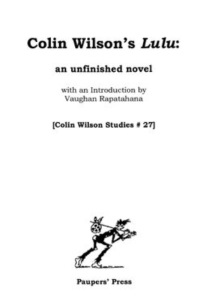 The “strongest forces” of the mind are fictionalised in Lulu, a novel which Wilson never finished (despite it’s twenty five year gestation and it’s eventual commission by the BBC) and is now presented in fragmentary form with appendices. It is a shame that this novel was never completed as it was intended to be something of an epic. Like his Metamorphosis of the Vampire, what remains of Lulu is something of a whispered rumour amongst hard core Wilson readers. When I asked Colin about it in 2007 he was certain he’d never finish it unless he found a millionaire patron. But fragmentary or not, and thanks to the efforts of Wilson scholar Vaughan Rapatahana and Wilson bibliographer Colin Stanley, it now appears in print – and unlike Metamorphosis of the Vampire, it’s in English…
The “strongest forces” of the mind are fictionalised in Lulu, a novel which Wilson never finished (despite it’s twenty five year gestation and it’s eventual commission by the BBC) and is now presented in fragmentary form with appendices. It is a shame that this novel was never completed as it was intended to be something of an epic. Like his Metamorphosis of the Vampire, what remains of Lulu is something of a whispered rumour amongst hard core Wilson readers. When I asked Colin about it in 2007 he was certain he’d never finish it unless he found a millionaire patron. But fragmentary or not, and thanks to the efforts of Wilson scholar Vaughan Rapatahana and Wilson bibliographer Colin Stanley, it now appears in print – and unlike Metamorphosis of the Vampire, it’s in English…
Wilson’s fiction would often make use of Brecht’s Alienation Effect. With Lulu however, this technique didn’t quite work. Wilson commented that Brecht’s “device works beautifully for short periods” and we should remember that most of his “parodic” novels are fairly short. So he remarks that Lulu “defeated me technically.” Perhaps because of this, he had problems maintaining first person narrative (which he abandoned) and more importantly, because “the novel is designed to describe action, not inner states”, he had problems communicating the central character’s state of mystical consciousness. A young man with a photographic memory – he can recall any page of text from Gray’s Anatomy – Theo Pelham is the son of a self made fashion designer. Although I eventually warmed to Theo – or what’s left of him in these fragments – my first impressions of him were of an obviously gifted, but rather socially awkward individual. At first, when reading his conversational reactions, he seemed to be closer to the autistic spectrum than the seventh degree of consciousness, but as the narrative progresses, we start to see a strong development. Set in the late Sixties, Theo mingles with Angry Brigade student revolutionary types, the underclass and Montague Summers style defrocked vicars. There are some great set pieces – the suicide in Lulu’s dingy lodgings being a particularly striking one. So although the novel itself is an unfinished fragment, and remains a tantalising glimpse of what could have been, the appendices help remind us of Wilson’s intentions – he is concerned “with the conflict between two points of view” of materialism and ‘mysticism’ as well as being a “parallel study in Lulu’s natural ‘sex magic'”. Should it have been finished, Lulu could have ended up like a gigantic hybrid of Ritual in the Dark, The Killer and The God of the Labyrinth.
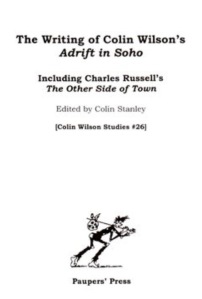 Adrift in Soho (1961) was also an unfinished novel – or rather a novel without a strict conclusion. Despite is slim size and haphazard construction it is still a hugely enjoyable read. (It has since been made into a film). Wilson kept his distance from scenes which would develop into “the Swinging Sixties”, saying (mostly) no to drugs “to induce higher states of consciousness, preferring more intellectually based methods” (as the introduction to The Writing of Colin Wilson’s Adrift in Soho points out). Because of this, Adrift in Soho isn’t so much of a period piece considering it documents the beatnik lifestyle. This recent addition to Paupers’ Press Colin Wilson Studies series – it’s volume 26 (Lulu is # 27) – contains the full text of Charles Russell’s The Other Side of Town. Russell, otherwise known as Belchier, was a thespian acquaintance of Wilson’s who wanted to find a publisher. Wilson thought Russell’s manuscript fascinating but probably unpublishable, so he basically rewrote it, adding elements of thinly disguised autobiography.
Adrift in Soho (1961) was also an unfinished novel – or rather a novel without a strict conclusion. Despite is slim size and haphazard construction it is still a hugely enjoyable read. (It has since been made into a film). Wilson kept his distance from scenes which would develop into “the Swinging Sixties”, saying (mostly) no to drugs “to induce higher states of consciousness, preferring more intellectually based methods” (as the introduction to The Writing of Colin Wilson’s Adrift in Soho points out). Because of this, Adrift in Soho isn’t so much of a period piece considering it documents the beatnik lifestyle. This recent addition to Paupers’ Press Colin Wilson Studies series – it’s volume 26 (Lulu is # 27) – contains the full text of Charles Russell’s The Other Side of Town. Russell, otherwise known as Belchier, was a thespian acquaintance of Wilson’s who wanted to find a publisher. Wilson thought Russell’s manuscript fascinating but probably unpublishable, so he basically rewrote it, adding elements of thinly disguised autobiography.
For scholars, inclusion of Russell’s manuscript is invaluable. There’s also a relevant section from Campion’s out of print Wilson biography and a section of unpublished notes from Wilson himself, plus a piece of first person reportage from The Sunday Dispatch at the start of 1961. My Night With the Beatniks is fairly self explanatory – “I always take a sleeping bag to London – you never know when you might need it.” Invited back to an enormous and noisy L shaped room, where a long haired beatnik strummed a guitar and another read from a bulky manuscript which “seemed to be a kind of poetry without metres”, Wilson “learned how a beat community was run.” Never sleeping until 4am or rising before midday, the eight male/four female community occupied an entire floor and survived by theft. Books were stolen (then sold to pay the rent) from Charing Cross Road, and self service stores were raided to make fairly disgusting sounding concoctions – “bacon, apples, raisins, cheese, tins of sardines and tins of soup” were all chucked into a communal cooking pot. This was washed down with cheap Spanish wine while Charlie Parker records played in the background. “No one had his own room – you slept anywhere you felt inclined.” A picture emerges of the drop out/squat culture that would last until perhaps the mid 1980’s. “You call everybody “man.”” Wilson sees this as a leftover from not only of Kerouac’s generation but of his own (unwanted) involvement with the Angry Young Men of the mid fifties. He sums up – “I am told that most beatniks end by taking a regular job and getting married.” Considering what happened to Charles Russell, who was something of a devotee of this bohemian anti-lifestyle, I see his logic. Writing to Wilson regarding his apparently idyllic life in the Mediterranean, a perfect hippie dream (it’s 1968) of lying in the sun, of beach-combing and weed, he ended up committing suicide in a German prison cell after bed been arrested trying to smuggle drugs worth £1500. Russell was 43 years old and of no fixed address.
Writing about Herbert Marcuse in the Collected Essays, Wilson notes that “real thinking crystallises from a cloud of intuitions, a forward moving excitement, which tends to make up its own terms as it goes along.” Marcuse would have doubtless found Charles Russell’s “Rousseauistic gush” perfectly rational, but his rigorous, emotionally driven dialectics leave no room for this cloud of intuitions, what Wilson calls “imponderables” (in literary terms, think Proust tasting the cake, Faust hearing the Easter bells etc). Real thinking uses everyday language as it’s basic instrument – like Wilson’s own clarified style – and “it has the advantage of allowing new considerations to slip into the argument without upsetting the whole scheme.” For Wilson, flexibility of thought is paramount. Reading these three books remind me how flexible Wilson’s thought was, and how exciting, unique and practical his insights continue to be. He developed a radical, workable method of creative perception, free from dogma and suffocating system building, free from the Messiah complexes which crippled too many of the mystics and philosophers he has discussed (see the Devils’s Party and Below the Iceberg). As John Shand writes in his introduction to the essays on philosophers, Wilson lived his outsider thesis, he didn’t, like David Hume, leave his philosophy behind in the seminar room. “If one really understood the outsider problem, had it as a lived part of one’s way of going on, something that permeated everything one might think and do, and think of doing, one then carried the problem into every aspect of one’s life whatever that life might consist of.”

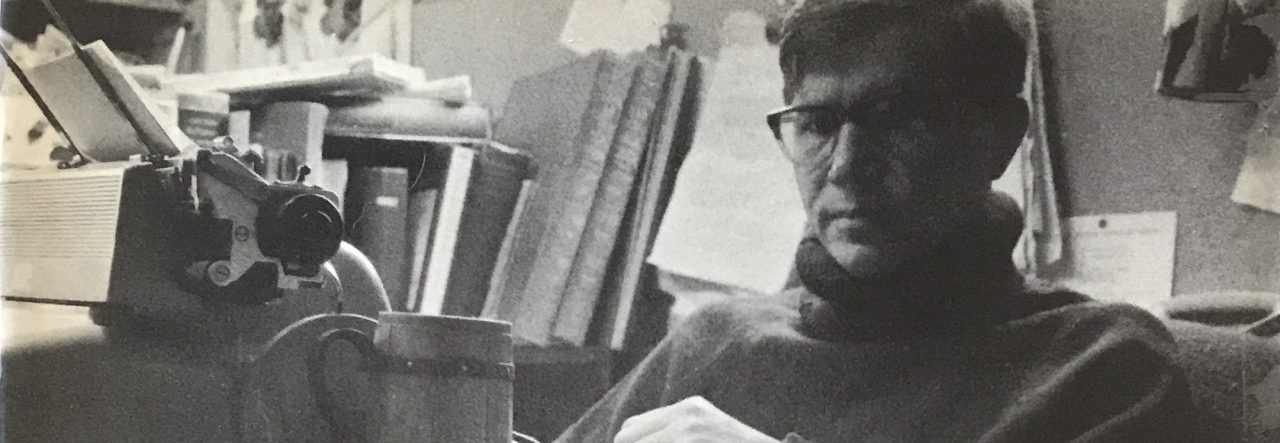

I would very much like to share this article and others on this site. Please install share buttons to make that easier. I love this blog, btw.
Mark
LikeLiked by 1 person
Thanks for your interest and kind comments, Mark – I’m redesigning the site as I speak so expect share buttons etc ASAP!
LikeLike
“If one really understood the outsider problem, had it as a lived part of one’s way of going on, something that permeated everything one might think and do, and think of doing, one then carried the problem into every aspect of one’s life whatever that life might consist of.”
This last quote could be applied to Buddhists. We – at least in Soto Zen, my own practice – endeavour to take the mindfulness of zen into oridinary, every day life. When doing the dishes, just do the dishes etc.
I regard Wilson as my first mentor – it was through reading his The Outsider when I was 21 which set me on a spiritual path. Many people today are waking up – resisting Wilson’s robot – thanks to people like Eckhart Tolle, Byron Katie and Ken Wilber. I don’t think Wilson gave due credit to this area of ‘awakening.’
LikeLiked by 1 person
Totally! Like CW said in his New Existentialism, (I’ll have to paraphrase) “Husserl suggested phenomenology could lead to enlightenment without recourse to specific mystical or yogic disciplines.” We’re attacking Heidegger’s ‘triviality of everydayness’ everyday…
LikeLike
I still think there is a danger of the philosophical approach – or phenomenological – being too intellectual. The Zen approach and for example, Eckhart Tolle isn’t mystical in the vague pejorative sense, it is extremely down to earth and practical. CW’s idea of wanting peak experiences to order was very naive and showed a rather ego-based ‘striving.’
LikeLiked by 1 person
In one of his last published books – Superconsciousness – he spoke of flow experience rather than peak experience. Which I think is more realistic
LikeLiked by 1 person
Great read thhank you
LikeLiked by 1 person